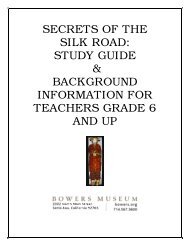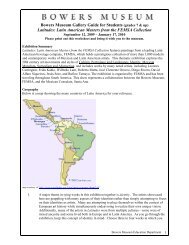A Resource Guide for Students and Teachers - Bowers Museum
A Resource Guide for Students and Teachers - Bowers Museum
A Resource Guide for Students and Teachers - Bowers Museum
You also want an ePaper? Increase the reach of your titles
YUMPU automatically turns print PDFs into web optimized ePapers that Google loves.
History<br />
of China<br />
Lead weight <strong>for</strong> measuring<br />
bags of grain<br />
16 TERRA COTTA WARRIORS<br />
Is it any wonder that the First<br />
Emporer conquered <strong>and</strong> united<br />
much of China after seeing such<br />
an impressive army? When Ying<br />
Zheng (the First Emperor’s birth<br />
name), ascended to the throne upon<br />
the death of his father in 246 BCE, he<br />
was only 13 years old. It is thought<br />
construction of the warriors was<br />
begun after he united China in 221.<br />
The previous Eastern Zhou Period<br />
laid the groundwork <strong>for</strong> the First<br />
Emperor to unify China. Due to the<br />
constant fighting during the Warring<br />
States Period, military, economic,<br />
social <strong>and</strong> political systems<br />
were created which gave<br />
him power <strong>and</strong> control to<br />
defeat the other states.<br />
In 230 BCE Ying<br />
Zheng began<br />
accomplishing<br />
his dream<br />
of unifying<br />
<strong>and</strong><br />
bringing<br />
under his<br />
control<br />
all the<br />
Warring<br />
States –<br />
Han, Zhao,<br />
Wei, Chu, Yan<br />
<strong>and</strong> Qi. By 221 BCE he<br />
had succeeded in creating the first<br />
centralized empire in Chinese history<br />
<strong>and</strong> declared himself Qin Shihuangdi<br />
– the First Emperor of the Qin. He<br />
had united l<strong>and</strong>s from the Gobi Desert<br />
to Vietnam to the Yellow Sea. It is<br />
said that Qin Shi Huang conquered<br />
China, “like a silkworm devouring<br />
a mulberry leaf.” The Period of the<br />
Warring States was over, yet he had<br />
to keep his army battle ready in order<br />
to deter rebellions by his conquered<br />
subjects <strong>and</strong> to protect his newly<br />
created empire from continued<br />
invasions from the north.<br />
In the period be<strong>for</strong>e Qin, the<br />
concept of the M<strong>and</strong>ate of Heaven<br />
developed. This meant that the ruler<br />
was given authority by Heaven <strong>and</strong><br />
that if he ruled well, he would remain<br />
in power. The First Emperor believed<br />
he had received this power to rule the<br />
entire world. He created the concept of<br />
“emperor” <strong>and</strong> all subsequent rulers<br />
of China had that title. A dynasty is<br />
a succession of rulers who all came<br />
from the same family. Although the<br />
Qin dynasty lasted only 15 years, until<br />
the death of the First Emperor’s son in<br />
206 BCE, it set into motion much of<br />
the groundwork that would maintain<br />
China as a leading power throughout<br />
world history. Some of his most long<br />
lasting accomplishments include:<br />
• Unified the seven Warring States<br />
ending centuries of war<br />
• Did away with much corruption<br />
by abolishing the inheritance<br />
Bronze ban liang coin<br />
of titles <strong>and</strong> offices <strong>and</strong><br />
creating a strict hierarchy<br />
based on merit <strong>and</strong><br />
achievement<br />
• Built a 4,700 mile network of<br />
roads throughout the empire with<br />
regular stops to provide a place to<br />
sleep<br />
• Linked <strong>and</strong> added to the great<br />
wall of China in order to protect<br />
his citizens from barbarian<br />
nomadic attacks<br />
• Built a canal system <strong>for</strong> irrigation<br />
<strong>and</strong> transportation<br />
• Established a single width <strong>for</strong><br />
cart axles so goods could be<br />
transported easily from province<br />
to province<br />
• St<strong>and</strong>ardized weights <strong>and</strong><br />
measures making trade more<br />
uni<strong>for</strong>m<br />
• Created a single currency<br />
• Combined the Chinese characters<br />
in writing which helped promote<br />
cultural unity<br />
• Pioneered the use of mass<br />
production <strong>and</strong> interchangeable<br />
parts (<strong>for</strong> the production of<br />
weapons <strong>and</strong> agricultural<br />
implements)<br />
• Codified the legal system by<br />
making all laws the same in all<br />
parts of the empire, <strong>and</strong> although<br />
harsh, was consistently applied<br />
The First Emperor is well known<br />
in Chinese history <strong>for</strong> his amazing<br />
advancements yet he is also known <strong>for</strong><br />
his ruthlessness towards his people. As<br />
he conquered the adjoining Warring<br />
States, he <strong>for</strong>ced the leading families<br />
to move to his capital at Xianyang,<br />
so he could keep them under the<br />
watchful eye of his bureaucracy. He<br />
rebuilt their palaces in Xianyang.<br />
The First Emperor chose his own<br />
assistants to go to their kingdoms<br />
to be the governors <strong>and</strong> judges. He<br />
set up a system of 36 comm<strong>and</strong>eries<br />
with governors <strong>and</strong> other officials<br />
appointed by the capital. By doing<br />
so he did away with a fragmented<br />
country <strong>and</strong> established a central<br />
government.<br />
The Chinese philosopher,<br />
Confucius, lived not long be<strong>for</strong>e the<br />
Qin dynasty. Confucianism stresses<br />
social harmony, justice, <strong>and</strong> devotion<br />
to family ancestors. Change meant<br />
going against one’s ancestors. The<br />
First Emperor felt that the teachings<br />
of Confucius conflicted with his<br />
progressive programs <strong>and</strong> laws. He<br />
burned any writings that did not have<br />
to do with agriculture <strong>and</strong> what he<br />
considered necessary occupations.





